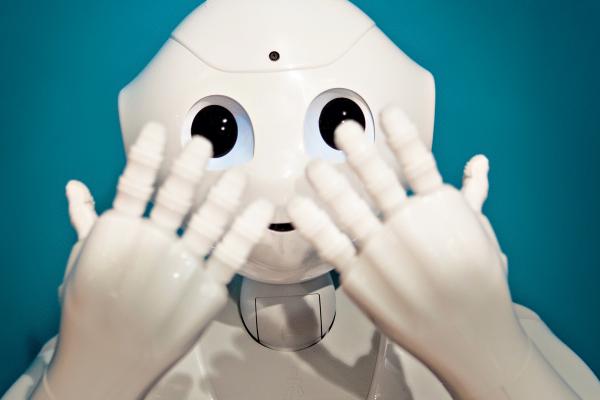Suddenly everybody is concerned about robots and machines, especially about artificial intelligence (AI), which is increasingly being incorporated in machines and is constantly becoming more advanced. Will artificial intelligence surpass ours soon?
The ability of algorithms to quickly compute complex things that us humans need to piece together laboriously step by step is a useful aspect of digitalization. However, a usurpation of power by robots is largely a nightmare fantasy of bad Hollywood movies. However, something else is going to happen: We will get used to living with robots. We will cease to even perceive them as machines and start to treat them as natural partners in a conversation or as co-workers (like we already do with Siri, or the voice of a GPS device). This will hold especially true once it becomes commonplace for machines to talk. All of the machines that work with or for us will be communicating, both among each other and with us. It's clear that these two kinds of conversation won't be about the same things: Alexa and Siri are trial balloons.

University professor on the chair of national economy and philosophy of the economic faculty of the university of Witten/Herdecke. Fields of research: Institution economy, economic philosophy, theory history, political economy, digitally economics.
If machines join us in communicating vocally, we are no longer forced to use text, SMS, mails, images, etc. We will communicate with machines at ear level, so to speak. This is the more trivial part of the statement. The less trivial one is that machines always approach us in a rational manner. They are – for now – emotionless (without being cold. Some people even experience the voices of Siri or Alexa as protoerotic). However, they ultimately communicate in only one dimension: Strictly rational.
Machines will civilize us
Before we nod and say “of course”, we should consider that our styles of communication will be affected by this. Machines won't be receptive to emotional, snide, impetuous, plaintive, vague or rambling communication. The algorithms will gently correct our moods and keep inquiring, relentlessly reasonable – or push the matter off to be dealt with later because they're not getting a useful answer from us. Machines won't have a way to deal with sloppy communication, unclear instructions or indecision – except by quietly bringing us to reason. We will more or less be coerced to ask reasonable questions and give reasonable answers. This is a quality of communication that, on average, we haven't mastered and aren't practicing enough in our daily lives.
Maybe machines will civilize us, not because they are programmed that way (though this could be a design goal), but simply because they are logical automata that can't help but be reasonable. Only a lousy machine would respond sloppily, ambiguously, or vaguely. Machines could take on a culture-forming role. This is an aspect that one easily forgets in all the euphoric concern about robots and algorithms.
Back to sender
Semantic algorithms could reject malicious utterings – I wouldn't dare to call them statements – not by deleting them outright, but by asking the speaker to translate them into passably civilized language. In general, any text – be it on Facebook, Twitter, or even in e-mails – could be rejected (back to sender) if it used incorrect language with grammatical errors or broken syntax. Half of what's written these days probably wouldn't make it through the language-forming filter.
An absurd idea? Why? Why do we permit that a major part of the communication in society takes place in low-quality language? If people want to let things slide in private, then that's their business – but not in public. The Internet and its civilizational rationality could offer a unique chance to enter into a new language culture. If you talk to machines using rude or vulgar language, they won't serve you.



